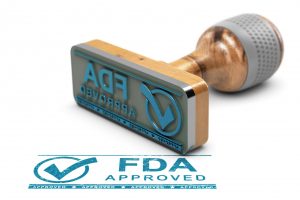 Artificial hips offer many patients the opportunity to live active and full lives, but sometimes they don’t always work as intended. Thankfully, these are relatively rare situations. Unfortunately, if it’s your artificial hip that fails, there’s not much comfort in knowing the artificial hips in most other patients work as designed. Because an artificial hip failure can be such a serious problem, the U.S. Food and Drug Administration (FDA) takes steps to ensure artificial hip medical devices receive adequate review and scrutiny before being approved for use in patients. One such step is to confirm that if a company modifies an already approved product, those changes also receive appropriate FDA approval and oversight. Apparently, Synovo Production, Inc. (Synovo) failed to obtain these necessary FDA approvals after making changes to one of Synovo’s hip replacement products. Let’s take a look at what products are affected and what action the FDA has taken.
Artificial hips offer many patients the opportunity to live active and full lives, but sometimes they don’t always work as intended. Thankfully, these are relatively rare situations. Unfortunately, if it’s your artificial hip that fails, there’s not much comfort in knowing the artificial hips in most other patients work as designed. Because an artificial hip failure can be such a serious problem, the U.S. Food and Drug Administration (FDA) takes steps to ensure artificial hip medical devices receive adequate review and scrutiny before being approved for use in patients. One such step is to confirm that if a company modifies an already approved product, those changes also receive appropriate FDA approval and oversight. Apparently, Synovo Production, Inc. (Synovo) failed to obtain these necessary FDA approvals after making changes to one of Synovo’s hip replacement products. Let’s take a look at what products are affected and what action the FDA has taken.
Affected Medical Devices
Synovo makes the Total Hip System (also known as the Total Hip Replacement System and the Preserve and Endotec BP), which the FDA cleared for medical use. However, the FDA claims that Synovo has made significant modifications to the following three components of this system: Femoral Resurfacing Cup, Acetabular Fixation Cup and Acetabular Bearing. Some of these components are also stand-alone products.
Because the FDA has not reviewed these modifications to ensure they’re safe and effective, the FDA issued a Safety Communication urging health care providers to stop using any of the three non-cleared components of the Synovo Total Hip System.
Potential Problems with the Synovo Total Hip System
Despite the FDA issuing this Safety Communication, there might not be anything wrong with the Total Hip System. Is it possible that the changes might actually make the product better? Maybe, maybe not. That being said, what changes were made?
The FDA’s Safety Communication doesn’t go into detail about what modifications Synovo made, but references a Warning Letter from March 2023 that discusses, among other things, Synovo’s changes to the Femoral Resurfacing Cup component.
Specifically, the letter outlined how the FDA cleared the Femoral Resurfacing Cup for use with cement to help attach it to the bone. However, the FDA notes that Synovo made changes to the product so that it received a different coating that would allow it to be attached to the bone without cement.
Attaching a hip replacement part to bone without cement may have some advantages, although this is apparently up for debate. Assuming for a moment that Synovo’s change to a cement-less hip implant is an improvement, they’d still need the FDA to confirm this is the case. After all, one of the reasons the FDA was created was in response to companies selling food and medical products that, at best, did not meet the marketing claims and at worst, harmed the consumer.
This isn’t to say Synovo is marketing and selling an unsafe product, but until the FDA can review the modification to the Femoral Resurfacing Cup and clear it as safe and effective, consumers and health care providers need to take notice.
What Patients Need to Do
The FDA recommends that patients who received any of the affected devices after 2019 should contact their health care provider if they experience problems with their hip implant. This includes:
- New or worsening pain
- Loosening of the hip
- Grinding or other noises coming from the hip
- Inability to put weight on the hip with the implant
- Any weakness in the hip or knee on the same side of the implant
If patients have no problems with the affected devices, the FDA doesn’t recommend surgery to remove the device. In other words, the FDA is suggesting a wait-and-see approach. However, the FDA asks patients with issues with their implants to notify the FDA through its MedWatch Voluntary Reporting Program.
FDA Recommendations for Health Care Professionals
 The FDA asks that health care providers do several things, but the most notable include not buying or implanting the affected devices. These health care providers should also remove any affected products from their inventory. Finally, health care professionals should closely monitor their patients who have received the Total Hip System or any individual component affected by the Safety Communication.
The FDA asks that health care providers do several things, but the most notable include not buying or implanting the affected devices. These health care providers should also remove any affected products from their inventory. Finally, health care professionals should closely monitor their patients who have received the Total Hip System or any individual component affected by the Safety Communication.
If you received Synovo’s Total Hip System or one of its components after 2019, there’s no need for alarm just yet unless you’re having problems with your hip. Based on the information so far, if Synovo did anything wrong, it was not getting the necessary approval from the FDA for the changes to the components. But in an abundance of caution, pay close attention to your hip and discuss any concerns you have with your health care provider. Most likely you’ll be fine, but in case you aren’t, you want to be prepared.
 North Carolina Product Liability Lawyer Blog
North Carolina Product Liability Lawyer Blog


